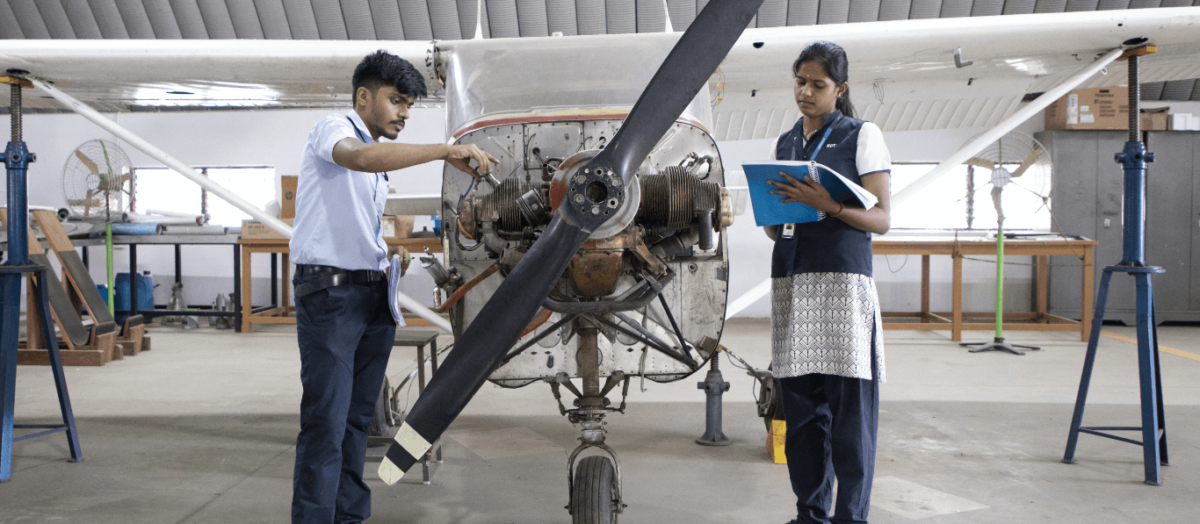

The Department of Aeronautical Engineering established in the year 2006, conducts the programme on B.E. Aeronautical Engineering with a vision to attain excellence and global reputation in Aeronautical Engineering education and research. Well qualified and experienced team of faculty of the department is committed to provide quality education by innovative teaching-learning processes. All the faculty of the department qualified in Aeronautical Engineering with different specializations are involved in continuously upgrading their skill. The activities of the department are governed by various committees such as Board of Studies, Department Advisory Board etc .in which the external expert members are drawn from well reputed educational institutions, industries and research centres. The curriculum is periodically reviewed in pace with the global industrial scenario utilizing the services of resource persons. Introduction of the choice based credit system enables the students to select the courses of his/her choice in various inter disciplinary areas of engineering. The department has state of the art infrastructure and laboratory facilities providing conducive learning environment to the students and faculty . The ongoing industry consultancy services and research projects are the motivation to the students learn beyond the curriculum and carry out innovative projects. Various Associations and professional bodies are actively involved in promoting co-curricular and extracurricular activities, aimed to improve the leadership qualities of the students. Internship in the leading industries and research centres such as HAL, NAL, ADA, ADE, DRDO etc are the good opportunities to understand the latest developments in the field of Aeronautical Engineering. The students are successful in pursuing higher studies in the leading institutions such as IITs, in India and leading universities in abroad. Well structured placement training enables the students to get placement in Government and Private sectors.
To attain excellence and global reputation in Aeronautical Engineering Education and Research.
M1: The department is committed to provide quality education in Aeronautical Engineering to students to build their career and do quality research and thus contribute to the field of Aviation and Aerospace.
M2: The department aims to prepare students for their higher studies and research to contribute to the advanced technological needs of Aeronautical engineering.
M3: To encourage faculty to update their knowledge and teaching-learning process through continuous learning.
M4: To undertake inter-disciplinary research to contribute and support the industry.
I. To pursue a successful profession in leading organizations.
II. To pursue postgraduate degrees and conduct research at leading technological universities to contribute to the advancement in the field of Aviation and Aerospace industries.
III. continue their professional development by utilizing educational and career building opportunities through their employer, educational institutions, or professional bodies.
PO1: Engineering knowledge: Apply the knowledge of mathematics, science, engineering fundamentals, and an engineering specialization to the solution of complex engineering problems.
PO2: Problem analysis: Identify, formulate, review research literature, and analyze complex engineering problems reaching substantiated conclusions using first principles of mathematics, natural sciences, and engineering sciences.
PO3: Design/development of solutions: Design solutions for complex engineering problems and design system components or processes that meet the specified needs with appropriate consideration for the public health and safety, and the cultural, societal, and environmental considerations.
PO4: Conduct investigations of complex problems: Use research-based knowledge and research methods including design of experiments, analysis and interpretation of data, and synthesis of the information to provide valid conclusions.
PO5: Modern tool usage: Create, select, and apply appropriate techniques, resources, and modern engineering and IT tools including prediction and modeling to complex engineering activities with an understanding of the limitations.
PO6: The engineer and society: Apply reasoning informed by the contextual knowledge to assess societal, health, safety, legal and cultural issues and the consequent responsibilities relevant to the professional engineering practice.
PO7: Environment and sustainability: Understand the impact of the professional engineering solutions in societal and environmental contexts, and demonstrate the knowledge of, and need for sustainable development.
PO8: Ethics: Apply ethical principles and commitment to professional ethics and responsibilities and norms of the engineering practice.
PO9: Individual and team work: Function effectively as an individual, and as a member or leader in diverse teams and in multidisciplinary settings.
PO10: Communication: Communicate effectively on complex engineering activities with the engineering community and with society at large, such as, being able to comprehend and write effective reports and design documentation, make effective presentations, and give and receive clear instructions.
PO11: Project management and finance: Demonstrate knowledge and understanding of the engineering and management principles and apply these to one’s own work, as a member and leader in a team, to manage projects and in multidisciplinary environments.
PO12: Life-long learning: Recognize the need for and have the preparation and ability to engage in independent and life-long learning in the broadest context of technological change.
PSO1: Apply fundamental principles of Aerodynamics, Structures, Propulsion, Materials, and Avionics to provide solutions to aerospace and non-aerospace industrial problems.
PSO2: Use the software packages in the design, manufacturing, testing and maintenance of aeronautical and aerospace based components and systems.
| Contact Info: | Address: |
| College: 0422-2661100 | Kumaraguru College of Technology (KCT), |
| Fax: 0422-2669406 | Athipalayam Rd,Chinnavedampatti, |
| Placement: 0422-2661515 | Coimbatore, |
| Principal: 0422-2661121 | Tamil Nadu 641049 |
| E-mail: info@kct.ac.in |